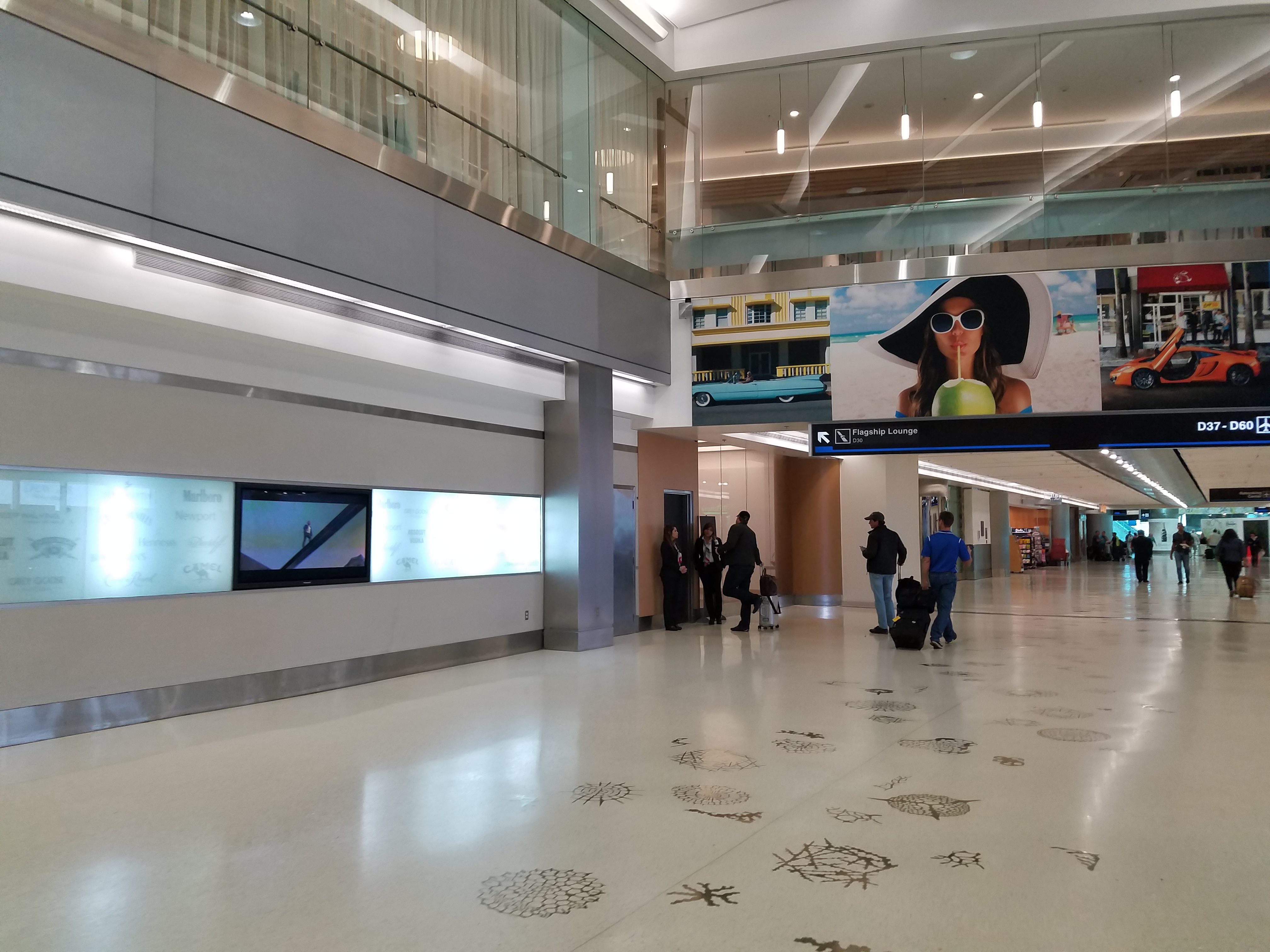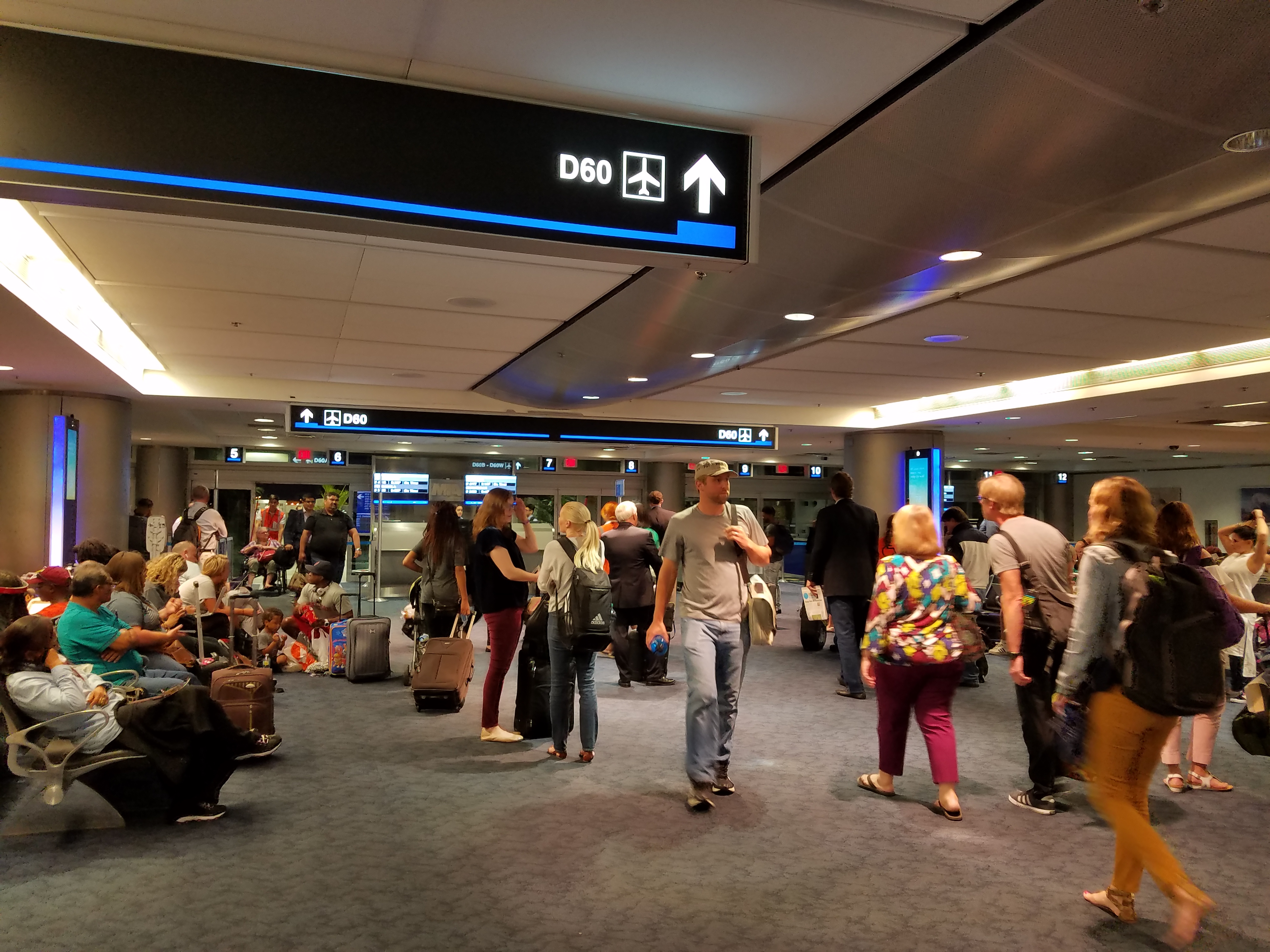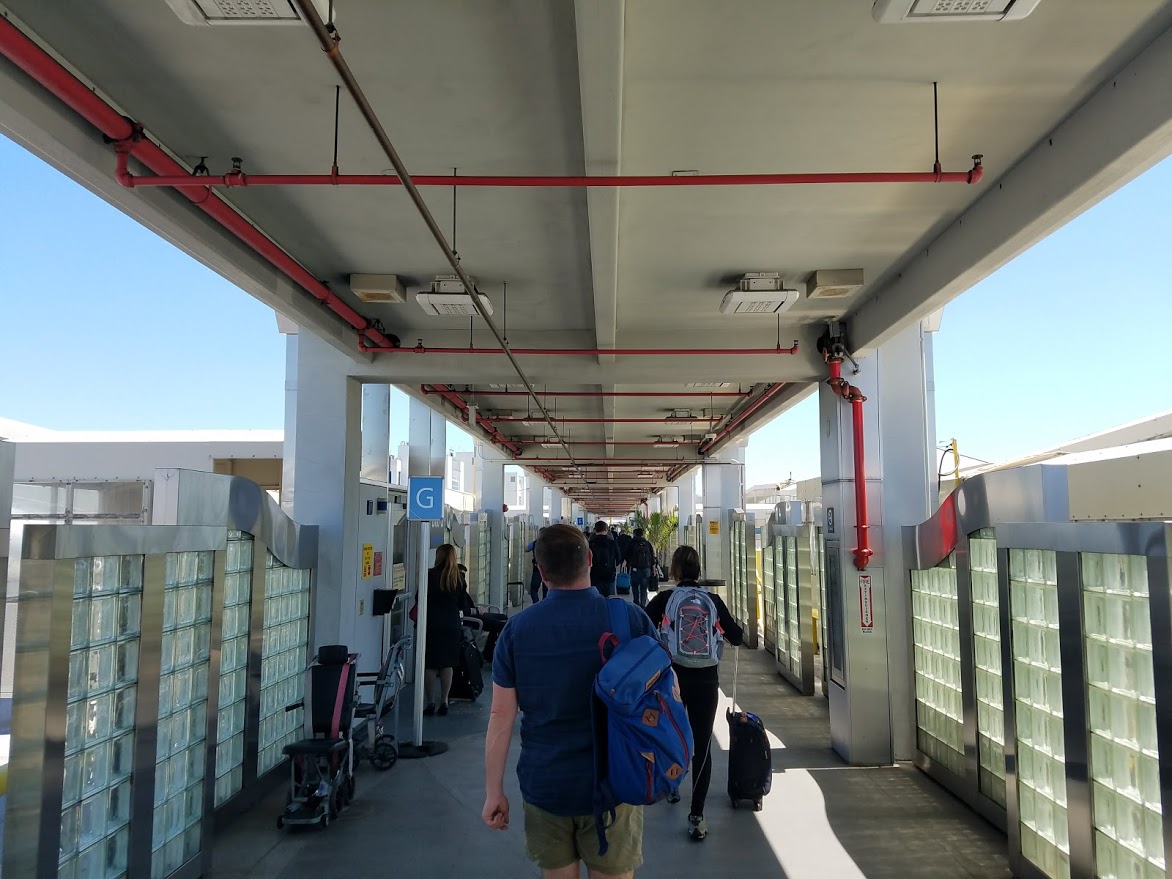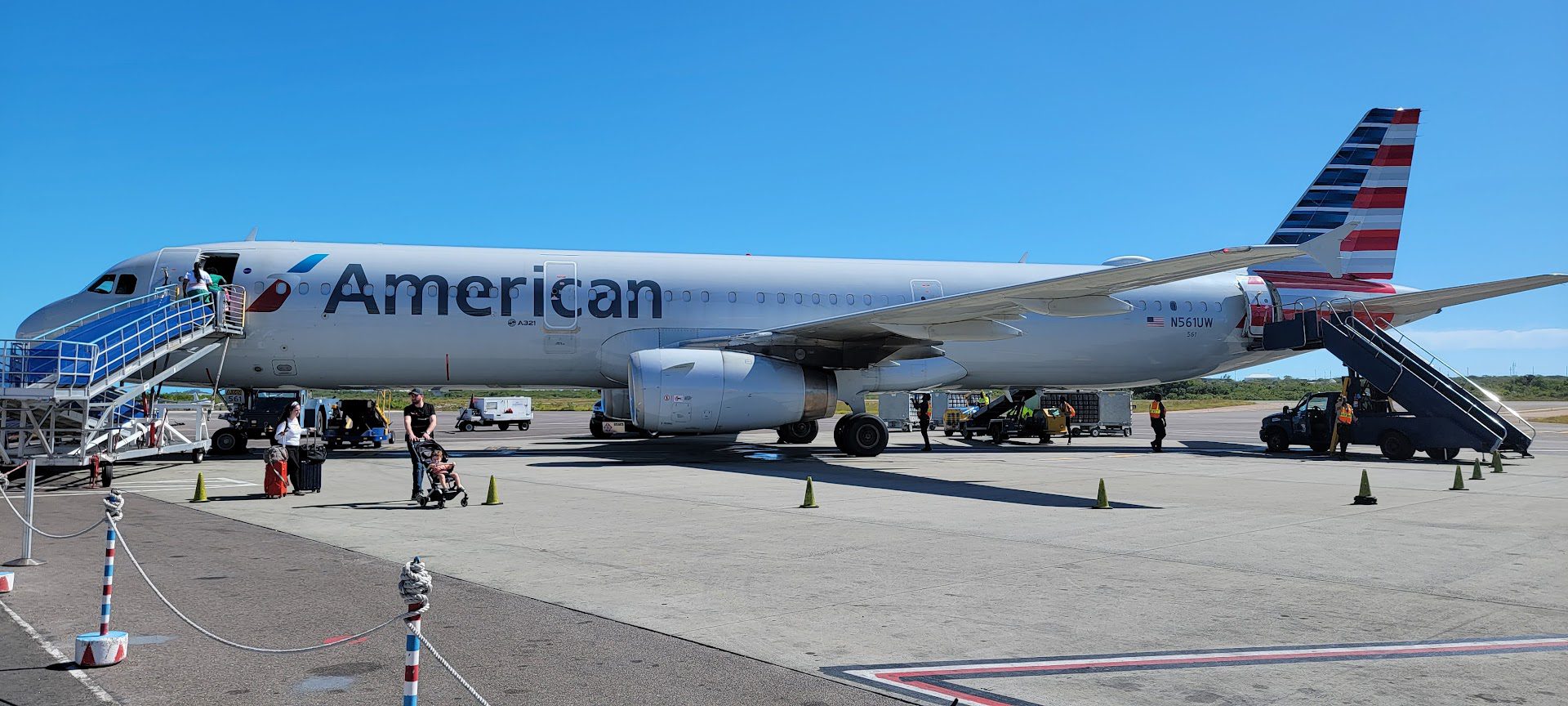On Friday, Gloryanna Samuel sued American Airlines alleging that their wheelchair attendant abandoned her at a gate in Miami, that she missed her flight as a result, and she was left to spend the night in a chair in a cold room at the airport as a result.

Since then she’s had swelling, arm pain and elevated blood pressure which aggravates pre-existing medical conditions. The case is Samuel v. American Airlines, Inc. & Envoy Air, Inc., No. 1:2025‑cv‑00037, U.S. District Court for the District of the Virgin Islands.
- In April 2025, Samuel booked St. Croix – Miami – Tampa on American and requested wheelchair assistance due to multiple medical conditions.
- After landing at Miami International Airport, an Envoy wheelchair attendant initially assisted, but allegedly abandoned her in the chair at the gate for her Tampa flight. Left there, she missed the flight.
- She was rebooked for the next morning. She asked for a hotel, but was told no – and she says she was directed to a cold public room in the airport and slept in a chair overnight, which caused swelling in her feet and eyes; left‑arm pain from propping her head through the night; and elevated blood pressure, which aggravated pre‑existing conditions.


Federal rules require prompt boarding, deplaning and connecting assistance; assistance “in moving within the terminal” from gate to gate, ticketing to gate, gate to baggage claim, etc. Assisted passengers can’t be left unattended in a wheelchair for more than 30 minutes.
There’s no private right of action under the Air Carrier Access Act. Enforcement is via the Department of Transportation. However, state law negligence claims generally go forward.
- American probably tries to argue that wheelchair assistance is a “service” so state claims are pre-empted by the Airline Deregulation Act, but that’s an uphill battle where this case was filed. The U.S. Virgin Islands are covered by the Third Circuit Court of Appeals and Elassaad v. Independence Air there clearly allows state claims for wheelchair service against an airline.
See also Abdullah v. American Airlines in the Third Circuit that suggests while state law cannot trump federal rules on standards for air safety, state (and territory) damage remedies still apply.
The events occurred in Miami so I expect a motion to transfer to the Southern District of Florida, or to Delaware (where American and Envoy Air are incorporated) or Texas (principal place of business).
The 11th Circuit (Florida) is much friendlier to a federal pre-emption argument, as is the 5th Circuit (Texas). In the Southern District of Florida, American successfully argued that assistance with wheelchair and prosthetics during boarding constitues “services” where state law is preempted. (Mennella v. American Airlines.)
- American should focus on pre‑existing conditions, and challenge medical evidence tying one night in a cold room to lasting injuries. Depending on what’s in security footage, they may seek to argue that she left the gate, declined offered assistance, or could have requested more assistance sooner.

American doesn’t have a duty to provide a hotel. There’s nothing in Part 382 requiring it for a missed connection or other assistance failure. The breach here is abandonment at the gate – lack of hotel is just bad optics.
If discovery shows she was left unattended beyond 30 minutes, and missed the connection as a result, then she is likely to succeed demonstrating breach of the airline’s duties.
But showing significant physical injury or lasting impairment directly resulting from the abandonment is going to be tough – perhaps prompting a modest settlement because this looks bad and there’s a sympathetic victim, but not a big payout.

Last year American was fined $50 million over its mishandling of disabled passengers and wheelchairs. They are consistently worst in the industry with wheelchairs, though here it’s ground service rather than lost or damaged chairs at issue. At many stations they outsource wheelchair service (to companies like Prospect, Menzies, G2) but in Miami I believe that service is provided directly by wholly-owned regional carrier Envoy Air. Outsourcing, though, wouldn’t be a defense since the regulatory obligation to ensure the service is provided remains with the airline.


There’s no excuse for the abandonment, but this doesn’t make sense to me:
“After landing at Miami International Airport, an Envoy wheelchair attendant initially assisted, but allegedly abandoned her in the chair at the gate for her Tampa flight. Left there, she missed the flight.”
If she was at the gate, with a boarding pass, how is she not calling out for assistance to get on the plane? I am not blaming her, just asking, cause this doesn’t make sense to me.
Nope…… lame excuses aren’t gonna work on this one, AA…….time to break out the checkbook.
Sadly, wheelchair service is worse at MIA. I am a CK, however, that status does not help when it comes to wheelchairs. Recently on a paid first class international at a cost of over $7000, I did not get service at LHR and was told by AA personnel that I needed to walk to an area to get a wheelchair. I told them if I could walk that far, then I wouldn’t need a WHCR. When I complained to AA customer service, they claimed that I refused a WHCR and didn’t request it on booking, both of which are false. My booking showed request for assistance and I did not refuse the chair.
I am a loyal AA traveler and have managed to have CK for 3 years now! That will not change my opinion but AA really needs to get their act together on providing assistance to those that need it and take responsibility when not provided!
Entitled to some compensation? Yes. Entitled to sue for millions…no.
Sitting in a chair for one night in a cold room is not enough to cause permanent harm. If the passenger or her attorney are claiming otherwise they are wrong. And, quite honestly, if she’s that fragile that a misconnection could cause this many medical maladies, maybe she shouldn’t be flying in the first place.
Plus the story of being abandoned at the gate doesn’t fly with me. She could have gotten someone’s attention. They always page for missing passengers at final boarding. Plus, they would have seen in her itinerary that she’s wheelchair assist. Then again, it’s AA, so who can really say?
The airlines have made me someone who now hates flying and is triggered easily at the airport (which I contain). Should I use AA, DL and UA for PTSD? I’m sure I could get some healthcare professional to say I have it.
Since this occurred at the airport and not in an airplane, the ADA may come into play. The passenger should have brought something to help assure she would be comfortable with any situation that could happen. I always take a winter jacket with me. It has helped when the airplane cabin temperature has been set too low.
The abandoned at the gate is a little fishy. Maybe taken to the wrong gate? Or the gate changed?
The carrier of record who sold the ticket and is the one with ultimate responsibility regardless of the actual company that pushes the chairs (though Gary is correct, it is Envoy at Miami). All of these contracts have SLAs in them that cover instances like this. The airline will get the disability complaint hit and the provider generally will end up paying the airline for whatever the outlay is – I have seen in cases where extreme negligence caused a corrective action be required by DOT to mitigate a larger fine like making IT programming changes or implementing iPads at a location that the provider ends up coughing up a chunk of it.
If an agent boarding a flight is missing someone and sees the wheelchair SSR (especially with the newer visual GUI-type systems, it does flag and make it apparent thanks to prior corrective actions), you’d think they would look around the area. Or reach out to the provider. I don’t know…. my third party contract gate agents at a ULCC even did that. But this is AA MIA we’re talking about. For all we know they made every boarding announcement in Spanish only (I had a recent MIA-CLT flight where not a single announcement in the gate was in English, and the agent argued with me that Alaska isn’t a partner of American and has zero seating benefit).
If I were the airline, I’d argue that if a misconnect and sleeping like that is going to cause such great permanent medical hardship then the passenger had pre-existing conditions they should have notified the airline of this in advance, or they may have been requested medical clearance to travel.
Whatever agent who told the passenger she couldn’t have a hotel room is an idiot. They should have gotten a supervisor or CRO. If someone misses their flight and says the wheelchair company took them the wrong place or abandoned them, that’s a carrier-controlled disruption. And either way that’s a situation you know you’re gonna hear about later on, so you give them a hotel. Even Spirit has done that… At minimum now you have on record you tried to help them, even if they decline, and you just mitigated your liability.
Not sure why she wasn’t boarded on her flight. MIA Airport is in itself an overnight hotel. If someone misses a flight there’s no one to stay with them overnight if they can’t afford a hotel or get to one their own. Once the attendant is due off the clock, they’re off the clock unless a supervisor agrees to pay them to stay over.
“Federal rules under the ACAA prohibit leaving an assisted passenger unattended in a wheelchair for more than 30 minutes.” Ugh, just settle, pay her, already, lest they want punitive damages, having messed this up for others in the past. Don’t make the bad PR even worse. C’mon.
I’m sick and tired of the whole airport wheelchair scam…..get up off your lazy ass and walk, unless you’re 100% crippled or missing a leg. No more crying wolf.
@bbkbob
Show a little empathy. You weren’t there. You don’t know shite.
Got an ambulance chaser and now sees inconvenience as a payday. I hope AA fights this all the way. So sick of our civil litigation system. Too many want a handout instead of dealing with the bumps that inevitably life brings. So sad!
@AlanZ — Well said. What’s gotten into folks; it’s as if they relish in others suffering. Any of us could end up needing mobility assistance at some point; not to mention, most of us either need caregivers or become caregivers.
@jns – Like it’s her fault? “I always bring a jacket!” Pathetic.
Sycophants like you are how airlines got away with turning flying into airborne greyhound bus rides.
@Cid Newman — Thank you for also calling out the ‘corporate shills’ that frequent this site. Agreed, @jns is wrong; being cold on an airplane is not the same as an actual disability. Sheesh.
Sorry for what I wrote previously- I take it all back.
@Retired Gamber.
I bet you are the type that thinks that all disabled people should just be euthanized because they are wasting oxygen or whatever.